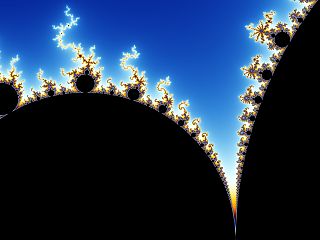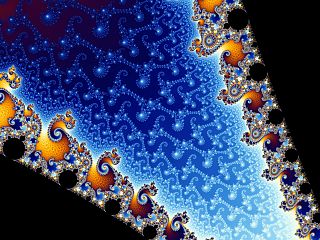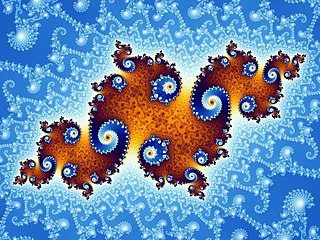Benoît Mandelbrot
| Benoît Mandelbrot | |
 Benoît Mandelbrot vid ett tal på École polytechnique fédérale de Lausanne 2007. | |
| Född | 20 november 1924 Warszawa, Polen |
|---|---|
| Död | 14 oktober 2010 (85 år) Cambridge, Massachusetts, USA |
| Bosatt i | Frankrike, USA |
| Institutioner | Yale University IBM Pacific Northwest National Laboratory |
| Alma mater | École Polytechnique California Institute of Technology Universitetet i Paris |
| Nämnvärda studenter | F. Kenton Musgrave Eugene F. Fama Murad S. Taqqu Nassim Nicholas Taleb Daniel Zajdenweber Yuval Gefen Adlai J. Fisher Laurent E. Calvet |
| Känd för | Mandelbrotmängden |
| Nämnvärda priser | Wolfpriset (1993) Japanpriset (2003) |
Benoît B. Mandelbrot, född 20 november 1924 i Warszawa, död 14 oktober 2010[1] i Cambridge, Massachusetts, var en polskfödd fransk-amerikansk matematiker av litauisk-judisk härkomst. Han var en frontfigur inom fraktal geometri.
Uppväxt
Mandelbrot föddes i Warszawa den 20 november 1924,[1] men familjen flyttade till Frankrike när han var 12 år. Hans familj hade starka akademiska traditioner, hans mor var medicine doktor, och en av hans farbröder, Szolem Mandelbrojt, var professor i matematik i Paris.
Mandelbrot studerade i Paris till andra världskrigets utbrott, då familjen flyttade till Tulle i södra Frankrike. 1944 återvände han till Paris och påbörjade studier i matematik vid École polytechnique med bland annat Gaston Julia och Paul Pierre Lévy som lärare. Han tog sin examen 1947 och tillbringade sedan två år vid California Institute of Technology där han studerade aerodynamik. Tillbaka i Frankrike fortsatte han sina matematiska studier vid Universitetet i Paris och tog där doktorsexamen 1952.
Mellan 1949 och 1957 var Mandelbrot medlem av Centre national de la recherche scientifique, och han tillbringade också ett år vid Institute for Advanced Study vid Princeton University i USA, understödd av John von Neumann. 1955 gifte han sig med Aliette Kagan, och de flyttade till Genève.
1958 flyttade familjen till USA där Mandelbrot fick anställning vid IBM:s J. Watson Research Centre i delstaten New York. Han var kvar hos IBM under resten av sitt yrkesverksamma liv och utnämndes till IBM Fellow, en hederstitel för framstående forskningsarbete.
Senare år
Från 1955 arbetade Mandelbrot med problem, och publicerade artiklar inom så vitt skilda områden som informationsteori, ekonomi och strömningsmekanik.
År 1967 publicerade han en artikel i tidskriften Science med titeln "How Long Is the Coast of Britain? Statistical Self-Similarity and Fractional Dimension" (se en kuststräckas längd). I denna skrift diskuterar Mandelbrot självsimulerande kurvor, kurvor där mönster och struktur upprepas regelbundet i allt mindre skala så att allt ser likadant ut oberoende av i vilken skala man betraktar dessa. Sådana kurvor har en fraktal dimension mellan 1 och 2 och är exempel på "fraktaler", en term Mandelbrot myntar, dock inte i denna skrift; ordet brukar han först år 1975 i publikationen Les objets fractals, forme, hasard et dimension.
1979, medan han var gästprofessor vid Harvard University, började Mandelbrot studera den fraktal som kallas Juliamängden. Han utgick då från tidigare arbeten av Gaston Julia och Pierre Fatou, och med hjälp av datorer framställde Mandelbrot bilder av Juliamängder till ekvationen z2 - c. Vid undersökningar av hur dessa Juliamängder berodde på den komplexa parametern c upptäckte han den efter honom uppkallade Mandelbrotmängden. 1982 publicerade han sina upptäckter i den mycket uppmärksammade skriften The Fractal Geometry of Nature. Boken beskriver inte bara Mandelbrot- och Juliamängderna utan även ett stort antal fraktaler som bygger på så kallade L-system. Mest känd av dessa är antagligen "Apträdet" (engelska monkeys' tree), som liksom många andra fraktaler i skriften bygger på von Kochs snöflinga, en kurva som Mandelbrot ofta använt som utgångspunkt för sina resonemang.
Efter att ha lämnat IBM år 1987 blev han Sterling Professor of Mathematical Sciences vid Yale University. Han tilldelades det prestigefyllda Japanpriset 2003 för sina upptäckter.
- Mandelbrotmängden, varje enskild bild är en förstoring av en del av den föregående bilden.
Referenser
- ^ [a b] Benoît Mandelbrot, Novel Mathematician, Dies at 85, New York Times den 16 oktober 2010.
Externa länkar
 Wikimedia Commons har media som rör Benoît Mandelbrot.
Wikimedia Commons har media som rör Benoît Mandelbrot.- Mandelbrots hemsida vid Yale
- Biografi
- Beskrivning av Apträdet
|
Media som används på denna webbplats
Författare/Upphovsman: Created by Wolfgang Beyer with the program Ultra Fractal 3., Licens: CC BY-SA 3.0
Partial view of the Mandelbrot set. Step 4 of a zoom sequence: The central endpoint of the "seahorse tail" is also a Misiurewicz point.
- Coordinates of the center: Re(c) = -.743,566,9, Im(c) = . 131,402,3
- Horizontal diameter of the image: .002,287,8
- Magnification relative to the initial image: 1,344.9
- Created by Wolfgang Beyer with the program Ultra Fractal 3.
- Uploaded by the creator.
Författare/Upphovsman: Wolfgang Beyer, Licens: CC BY-SA 3.0
* Partial view of the Mandelbrot set. Step 14 of a zoom sequence: On the first sight these islands seem to consist on infinitely many parts like Cantor sets, as it is actually the case for the corresponding Julia set Jc. Here they are connected by tiny structures so that the whole represents a simply connected set. These tiny structures meet each other at a satellite in the center which is too small to be recognized at this magnification. The value of c for the corresponding Jc is not that of the image center but has relative to the main body of the Mandelbrot set the same position as the center of this image relative to the satellite shown in zoom step 7.
- Coordinates of the center: Re(c) = -.743,643,887,037,151, Im(c) = .131,825,904,205,330
- Horizontal diameter of the image: .000,000,000,051,299
- Magnification relative to the initial image: 59,979,000,000
Författare/Upphovsman: Created by Wolfgang Beyer with the program Ultra Fractal 3., Licens: CC BY-SA 3.0
Partial view of the Mandelbrot set. Step 9 of a zoom sequence: The "seahorse valley" of the satellite. All the structures from the image of zoom step 1 reappear.
- Coordinates of the center: Re(c) = -.743,644,099,61, Im(c) = .131,826,046,88
- Horizontal diameter of the image: .000,000,662,08
- Magnification relative to the initial image: 4,647,300
- Created by Wolfgang Beyer with the program Ultra Fractal 3.
- Uploaded by the creator.
Författare/Upphovsman: Created by Wolfgang Beyer with the program Ultra Fractal 3., Licens: CC BY-SA 3.0
Partial view of the Mandelbrot set. Step 10 of a zoom sequence: Double-spirals and "seahorses". Unlike the image of zoom step 2 they have appendices consisting of structures like "seahorse tails". This demonstrates the typical linking of n+1 different structures in the environment of satellites of the order n, here for the simplest case n=1.
- Coordinates of the center: Re(c) = -.743,643,862,69, Im(c) = .131,825,902,71
- Horizontal diameter of the image: .000,000,135,26
- Magnification relative to the initial image: 22,748,000
- Created by Wolfgang Beyer with the program Ultra Fractal 3.
- Uploaded by the creator.
Författare/Upphovsman: Created by Wolfgang Beyer with the program Ultra Fractal 3., Licens: CC BY-SA 3.0
Partial view of the Mandelbrot set. Step 2 of a zoom sequence: On the left double-spirals, on the right "seahorses".
- Coordinates of the center: Re(c) = -.759,856, Im(c) = .125,547
- Horizontal diameter of the image: .051,579
- Magnification relative to the initial image: 59,654
- Created by Wolfgang Beyer with the program Ultra Fractal 3.
- Uploaded by the creator.
Författare/Upphovsman: Created by Wolfgang Beyer with the program Ultra Fractal 3., Licens: CC BY-SA 3.0
Mandelbrot set. Initial image of a zoom sequence: Mandelbrot set with continuously colored environment.
- Coordinates of the center: Re(c) = -.7, Im(c) = 0
- Horizontal diameter of the image: 3.076,9
- Created by Wolfgang Beyer with the program Ultra Fractal 3.
- Uploaded by the creator.
Författare/Upphovsman: Created by Wolfgang Beyer with the program Ultra Fractal 3., Licens: CC BY-SA 3.0
Partial view of the Mandelbrot set. Step 5 of a zoom sequence: Part of the "tail". There is only one path consisting of the thin structures which leads through the whole "tail". This zigzag path passes the "hubs" of the large objects with 25 "spokes" on the inner and outer sides of the "tail". It makes sure, that the Mandelbrot set is a so called simply connected set. That means there are no islands and no loop roads around a hole.
- Coordinates of the center: Re(c) = -.743,649,90, Im(c) = . 131,882,04
- Horizontal diameter of the image: .000,738,01
- Magnification relative to the initial image: 4,169.2
- Created by Wolfgang Beyer with the program Ultra Fractal 3.
- Uploaded by the creator.
Författare/Upphovsman: Created by Wolfgang Beyer with the program Ultra Fractal 3., Licens: CC BY-SA 3.0
Partial view of the Mandelbrot set. Step 8 of a zoom sequence: "Antenna" of the satellite. Several satellites of second order can be recognized.
- Coordinates of the center: Re(c) = -.743,644,786,0, Im(c) = .131,825,253,6
- Horizontal diameter of the image: .000,002,933,6
- Magnification relative to the initial image: 1,048,800
- Created by Wolfgang Beyer with the program Ultra Fractal 3.
- Uploaded by the creator.
Författare/Upphovsman: Created by Wolfgang Beyer with the program Ultra Fractal 3., Licens: CC BY-SA 3.0
Partial view of the Mandelbrot set. Step 6 of a zoom sequence: Satellite. The two "seahorse tails" are the beginning of a series of concentrical crowns with the satellite in the center.
- Coordinates of the center: Re(c) = -.743,640,85, Im(c) = .131,827,33
- Horizontal diameter of the image: .000,120,68
- Magnification relative to the initial image: 25,497
- Created by Wolfgang Beyer with the program Ultra Fractal 3.
- Uploaded by the creator.
Författare/Upphovsman: Created by Wolfgang Beyer with the program Ultra Fractal 3., Licens: CC BY-SA 3.0
Partial view of the Mandelbrot set. Step 4 of a zoom sequence: The central endpoint of the "seahorse tail" is also a Misiurewicz point.
- Coordinates of the center: Re(c) = -.743,643,900,055, Im(c) = .131,825,890,901
- Horizontal diameter of the image: .000,000,049,304
- Magnification relative to the initial image: 62,407,000
- Created by Wolfgang Beyer with the program Ultra Fractal 3.
- Uploaded by the creator.
Författare/Upphovsman: Created by Wolfgang Beyer with the program Ultra Fractal 3., Licens: CC BY-SA 3.0
Partial view of the Mandelbrot set. Step 13 of a zoom sequence: Part of the "double-hook".
- Coordinates of the center: Re(c) = -.743,643,887,173,42, Im(c) = .131,825,904,251,82
- Horizontal diameter of the image: .000,000,000,598,49
- Magnification relative to the initial image: 5,141,100,000
- Created by Wolfgang Beyer with the program Ultra Fractal 3.
- Uploaded by the creator.
Författare/Upphovsman: Created by Wolfgang Beyer with the program Ultra Fractal 3., Licens: CC BY-SA 3.0
Partial view of the Mandelbrot set. Step 12 of a zoom sequence: In the outer part of the appendices islands of structures can be recognized. They have a shape like Julia sets Jc. The largest of them can be found in the center of the "double-hook" on the right side.
- Coordinates of the center: Re(c) = -.743,643,888,570,6, Im(c) = .131,825,904,312,4
- Horizontal diameter of the image: .000,000,004,149,3
- Magnification relative to the initial image: 741,550,000
- Created by Wolfgang Beyer with the program Ultra Fractal 3.
- Uploaded by the creator.
Författare/Upphovsman: Created by Wolfgang Beyer with the program Ultra Fractal 3., Licens: CC BY-SA 3.0
Partial view of the Mandelbrot set. Step 1 of a zoom sequence: Gap between the "head" and the "body" also called the "seahorse valley".
- Coordinates of the center: Re(c) = -.875,91, Im(c) = .204,64
- Horizontal diameter of the image: .531,84
- Magnification relative to the initial image: 5.785,4
- Created by Wolfgang Beyer with the program Ultra Fractal 3.
- Uploaded by the creator.
Författare/Upphovsman: Created by Wolfgang Beyer with the program Ultra Fractal 3., Licens: CC BY-SA 3.0
Partial view of the Mandelbrot set. Step 7 of a zoom sequence: Each of these crowns consists of similar "seahorse tails". Their number increases with powers of 2, a typical phenomenon in the environment of satellites. The unique path to the spiral center mentioned in zoom step 5 passes the satellite from the groove of the cardioid to the top of the "antenna" on the "head". Also observe that the starting view is located in the center.
- Coordinates of the center: Re(c) = -.743,643,135, Im(c) = .131,825,963
- Horizontal diameter of the image: .000,014,628
- Magnification relative to the initial image: 210,350
- Created by Wolfgang Beyer with the program Ultra Fractal 3.
- Uploaded by the creator.
Författare/Upphovsman: Rama, Licens: CC BY-SA 2.0 fr
Benoît Mandelbrot at the EPFL, on the 14h of March 2007
Författare/Upphovsman: Created by Wolfgang Beyer with the program Ultra Fractal 3., Licens: CC BY-SA 3.0
Partial view of the Mandelbrot set. Step 3 of a zoom sequence: "Seahorse" upside down. Its "body" is composed by 25 "spokes" consisting of 2 groups of 12 "spokes" each and one "spoke" connecting to the main cardioid. These 2 groups can be attributed by some kind of metamorphosis to the 2 "fingers" of the "upper hand" of the Mandelbrot set. Therefore the number of "spokes" increases from one "seahorse" to the next by 2. The "hub" is a so called Misiurewicz point. Between the "upper part of the body" and the "tail" a distorted satellite can be recognized.
- Coordinates of the center: Re(c) = -.743,030, Im(c) = .126,433
- Horizontal diameter of the image: .016,110
- Magnification relative to the initial image: 190.99
- Created by Wolfgang Beyer with the program Ultra Fractal 3.
- Uploaded by the creator.































